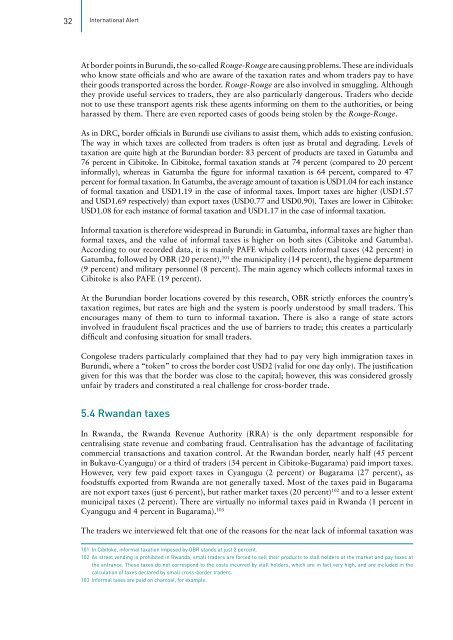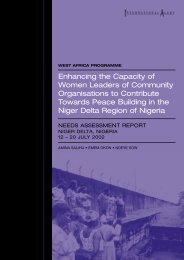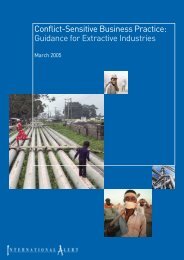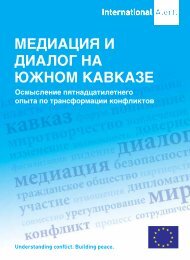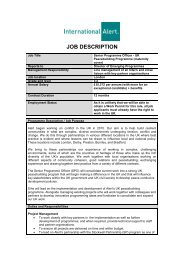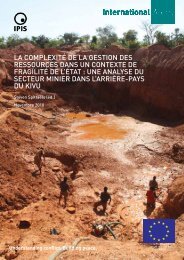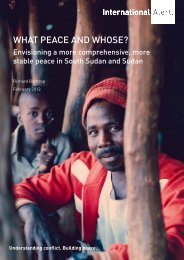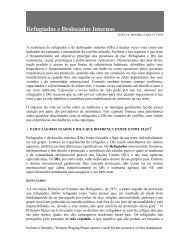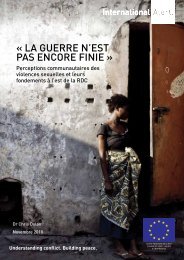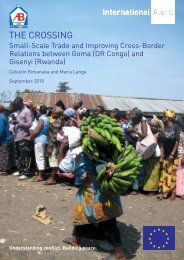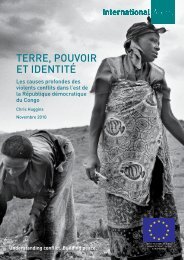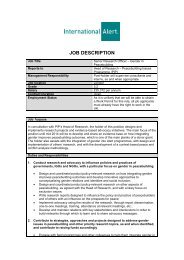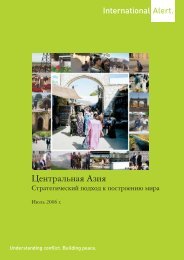Walking in the Dark: informal Cross-border trade ... - International Alert
Walking in the Dark: informal Cross-border trade ... - International Alert
Walking in the Dark: informal Cross-border trade ... - International Alert
You also want an ePaper? Increase the reach of your titles
YUMPU automatically turns print PDFs into web optimized ePapers that Google loves.
32 <strong>International</strong> <strong>Alert</strong><br />
At <strong>border</strong> po<strong>in</strong>ts <strong>in</strong> Burundi, <strong>the</strong> so-called Rouge-Rouge are caus<strong>in</strong>g problems. These are <strong>in</strong>dividuals<br />
who know state officials and who are aware of <strong>the</strong> taxation rates and whom <strong>trade</strong>rs pay to have<br />
<strong>the</strong>ir goods transported across <strong>the</strong> <strong>border</strong>. Rouge-Rouge are also <strong>in</strong>volved <strong>in</strong> smuggl<strong>in</strong>g. Although<br />
<strong>the</strong>y provide useful services to <strong>trade</strong>rs, <strong>the</strong>y are also particularly dangerous. Traders who decide<br />
not to use <strong>the</strong>se transport agents risk <strong>the</strong>se agents <strong>in</strong>form<strong>in</strong>g on <strong>the</strong>m to <strong>the</strong> authorities, or be<strong>in</strong>g<br />
harassed by <strong>the</strong>m. There are even reported cases of goods be<strong>in</strong>g stolen by <strong>the</strong> Rouge-Rouge.<br />
As <strong>in</strong> DRC, <strong>border</strong> officials <strong>in</strong> Burundi use civilians to assist <strong>the</strong>m, which adds to exist<strong>in</strong>g confusion.<br />
The way <strong>in</strong> which taxes are collected from <strong>trade</strong>rs is often just as brutal and degrad<strong>in</strong>g. Levels of<br />
taxation are quite high at <strong>the</strong> Burundian <strong>border</strong>: 83 percent of products are taxed <strong>in</strong> Gatumba and<br />
76 percent <strong>in</strong> Cibitoke. In Cibitoke, formal taxation stands at 74 percent (compared to 20 percent<br />
<strong>in</strong>formally), whereas <strong>in</strong> Gatumba <strong>the</strong> figure for <strong>in</strong>formal taxation is 64 percent, compared to 47<br />
percent for formal taxation. In Gatumba, <strong>the</strong> average amount of taxation is USD1.04 for each <strong>in</strong>stance<br />
of formal taxation and USD1.19 <strong>in</strong> <strong>the</strong> case of <strong>in</strong>formal taxes. Import taxes are higher (USD1.57<br />
and USD1.69 respectively) than export taxes (USD0.77 and USD0.90). Taxes are lower <strong>in</strong> Cibitoke:<br />
USD1.08 for each <strong>in</strong>stance of formal taxation and USD1.17 <strong>in</strong> <strong>the</strong> case of <strong>in</strong>formal taxation.<br />
Informal taxation is <strong>the</strong>refore widespread <strong>in</strong> Burundi: <strong>in</strong> Gatumba, <strong>in</strong>formal taxes are higher than<br />
formal taxes, and <strong>the</strong> value of <strong>in</strong>formal taxes is higher on both sites (Cibitoke and Gatumba).<br />
Accord<strong>in</strong>g to our recorded data, it is ma<strong>in</strong>ly PAFE which collects <strong>in</strong>formal taxes (42 percent) <strong>in</strong><br />
Gatumba, followed by OBR (20 percent), 101 <strong>the</strong> municipality (14 percent), <strong>the</strong> hygiene department<br />
(9 percent) and military personnel (8 percent). The ma<strong>in</strong> agency which collects <strong>in</strong>formal taxes <strong>in</strong><br />
Cibitoke is also PAFE (19 percent).<br />
At <strong>the</strong> Burundian <strong>border</strong> locations covered by this research, OBR strictly enforces <strong>the</strong> country’s<br />
taxation regimes, but rates are high and <strong>the</strong> system is poorly understood by small <strong>trade</strong>rs. This<br />
encourages many of <strong>the</strong>m to turn to <strong>in</strong>formal taxation. There is also a range of state actors<br />
<strong>in</strong>volved <strong>in</strong> fraudulent fiscal practices and <strong>the</strong> use of barriers to <strong>trade</strong>; this creates a particularly<br />
difficult and confus<strong>in</strong>g situation for small <strong>trade</strong>rs.<br />
Congolese <strong>trade</strong>rs particularly compla<strong>in</strong>ed that <strong>the</strong>y had to pay very high immigration taxes <strong>in</strong><br />
Burundi, where a “token” to cross <strong>the</strong> <strong>border</strong> cost USD2 (valid for one day only). The justification<br />
given for this was that <strong>the</strong> <strong>border</strong> was close to <strong>the</strong> capital; however, this was considered grossly<br />
unfair by <strong>trade</strong>rs and constituted a real challenge for cross-<strong>border</strong> <strong>trade</strong>.<br />
5.4 Rwandan taxes<br />
In Rwanda, <strong>the</strong> Rwanda Revenue Authority (RRA) is <strong>the</strong> only department responsible for<br />
centralis<strong>in</strong>g state revenue and combat<strong>in</strong>g fraud. Centralisation has <strong>the</strong> advantage of facilitat<strong>in</strong>g<br />
commercial transactions and taxation control. At <strong>the</strong> Rwandan <strong>border</strong>, nearly half (45 percent<br />
<strong>in</strong> Bukavu-Cyangugu) or a third of <strong>trade</strong>rs (34 percent <strong>in</strong> Cibitoke-Bugarama) paid import taxes.<br />
However, very few paid export taxes <strong>in</strong> Cyangugu (2 percent) or Bugarama (27 percent), as<br />
foodstuffs exported from Rwanda are not generally taxed. Most of <strong>the</strong> taxes paid <strong>in</strong> Bugarama<br />
are not export taxes (just 6 percent), but ra<strong>the</strong>r market taxes (20 percent) 102 and to a lesser extent<br />
municipal taxes (2 percent). There are virtually no <strong>in</strong>formal taxes paid <strong>in</strong> Rwanda (1 percent <strong>in</strong><br />
Cyangugu and 4 percent <strong>in</strong> Bugarama). 103<br />
The <strong>trade</strong>rs we <strong>in</strong>terviewed felt that one of <strong>the</strong> reasons for <strong>the</strong> near lack of <strong>in</strong>formal taxation was<br />
101 In Cibitoke, <strong>in</strong>formal taxation imposed by OBR stands at just 2 percent.<br />
102 As street vend<strong>in</strong>g is prohibited <strong>in</strong> Rwanda, small <strong>trade</strong>rs are forced to sell <strong>the</strong>ir products to stall holders at <strong>the</strong> market and pay taxes at<br />
<strong>the</strong> entrance. These taxes do not correspond to <strong>the</strong> costs <strong>in</strong>curred by stall holders, which are <strong>in</strong> fact very high, and are <strong>in</strong>cluded <strong>in</strong> <strong>the</strong><br />
calculation of taxes declared by small cross-<strong>border</strong> <strong>trade</strong>rs.<br />
103 Informal taxes are paid on charcoal, for example.


